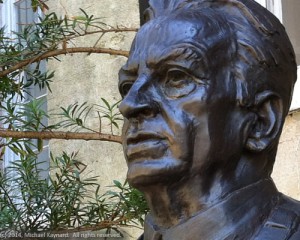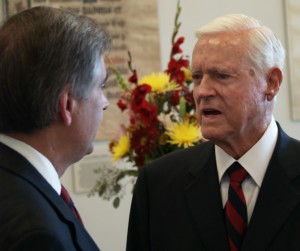By Andy Brack, editor and publisher | At age 93, Fritz Hollings is still teaching us.
![]() On Friday as a weekend deluge of rain started, dignitaries from all over gathered at St. Michael’s Church at the Four Corners of Law to rename the federal courthouse annex across the street that was named in 1988 for Hollings.
On Friday as a weekend deluge of rain started, dignitaries from all over gathered at St. Michael’s Church at the Four Corners of Law to rename the federal courthouse annex across the street that was named in 1988 for Hollings.
The senator, who got money put in the federal budget to construct the judicial center, never really wanted it named for him. U.S. Sen. Strom Thurmond, who had all sorts of things named for him by that time, apparently thought Hollings needed something named for him too.
Hollings, whose intelligence and personality sometimes can suck the oxygen right out of a room, apparently was surprised as anyone when the ceremony came 27 years ago. Almost immediately and for years later in private conversations, he would say he was honored but suggested the building really should be named for the late federal Judge J. Waties Waring.
Back in the middle of the last century, Waring, a lawyer’s lawyer from Charleston, incurred the wrath of the white establishment by listening to and ruling on civil rights cases by applying the rule of law, not the customs of segregation. He ruled blacks should be able to vote in the all-white Democratic primary. And in 1951, he wrote that segregated schools were unconstitutional. Three years later when the unanimous landmark Brown v. Board of Education decision was announced, it was crystal clear that Waring’s dissent was the foundation of the case that changed America.
For standing up for what was right, Waring and his wife were ostracized. Bricks broke windows at their Meeting Street home. A cross was burned. Federal authorities protected them. Soon after the publication of the dissent, Waring retired. He moved to New York City, never to return alive to his hometown of Charleston.

From a statue of Waring in the garden of the now-named J. Waties Waring Judicial Center; 2014 photo.
Hollings, as a young lawyer after World War II, appeared in court before Waring. He remembers how the judge helped young lawyers. He remembers Waring’s insights on how America is a government of laws, not a government of men. In 1962 after four years of what Mayor Joe Riley called “the most robust period of governmental leadership in South Carolina history,” Hollings spread Waring’s message about the rule of law in a speech that led to the peaceful integration of Clemson University.
So it’s not surprising that Hollings has long felt a little funny about a courthouse bearing his name when Waring made history next door. It’s an itch he needed to scratch, but not an itch that those in power really wanted to scratch for him. U.S. Sen. Lindsey Graham and U.S. Rep. Jim Clyburn, who eventually pushed through bills to rename the annex for Waring, admitted Friday that they were uncomfortable with changing the name because they didn’t want to dishonor Hollings.
But Hollings persisted. He knew it was the right thing to do. Now, many say it is an act of humility. They laud him for following his conscience in doing the right thing to honor Waring. They praise him for shining the light on Waring, forgotten for decades by South Carolinians.
Clyburn noted during the Friday ceremony that Hollings is the first person to ever ask for his name to be taken off a federal building and for it to be renamed for someone else. And then he added, “Fritz, you have shown us so many ways how to be a real person, and this has to be right at the top.”
This is the essence of what is really going with the renaming. By asking for Waring to be honored, Hollings is really trying to guide a South Carolina split by factional politics toward focusing on doing what is right for everybody who lives here.
He’s also showing the real meaning of selfless public service. After a life of creating opportunities for people — whether the millions who got better jobs because of skills learned at technical colleges or millions of children who got better early feeding because of federal nutritional programs started by Hollings or through the pragmatic use of power to get the government to behave — Hollings knows he doesn’t need a building named for him to validate a life spent helping people. He knows he doesn’t need to get credit for doing what should have been done in 1988.
But I think he also knows it’s important today for South Carolina to remember and be proud of the real courage displayed by Waties Waring and the dozens of black families of Clarendon County in the late 1940s who risked everything to fight for the freedom and equality guaranteed in the Constitution.
By asking for the annex to be renamed, Hollings is really reminding us what true public service is. By example, he’s again showing us what real leadership looks like.
For that, we should be grateful. And now in a state sorely lacking the leaders to make tough decisions, we, more than ever, need to listen, learn and emulate his example.
Andy Brack is editor and publisher of Charleston Currents and Statehouse Report. You can reach him at: editor@charlestoncurrents.com





 We Can Do Better, South Carolina!
We Can Do Better, South Carolina!
























